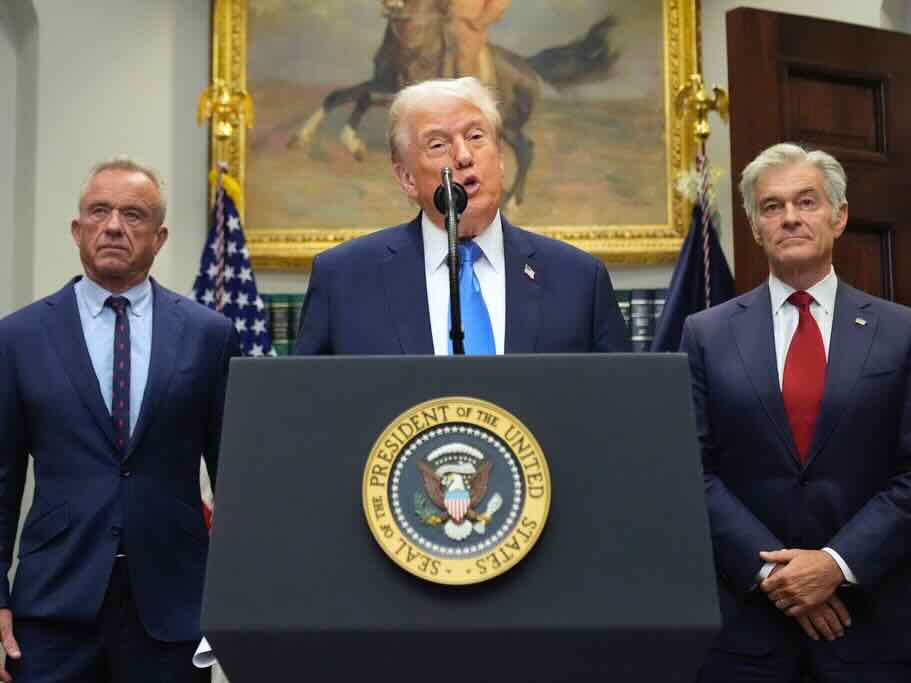President Donald Trump and Secretary of Health and Human Services (HHS) Robert F. Kennedy Jr. announced a potential cause of autism and a new treatment for children on the spectrum during at a White House event on Monday.
After teasing the news during his eulogy at Charlie Kirk’s memorial service over the weekend, President Trump and HHS officials revealed a potential major scientific breakthrough – a possible cause for autism.
Possible Cause
As reported on Tuesday’s AM Update, the president said the U.S. Food and Drug Administration will immediately begin notifying physicians that the use of acetaminophen, which is commonly known as Tylenol, during pregnancy can be associated with an increased risk of autism.
“For this reason, they are strongly recommending that women limit Tylenol use during pregnancy unless medically necessary,” Trump said. “That is, for instance, in cases of extremely high fever.
According to the Associated Press, one in 10,000 children in the early 1990s were diagnosed with autism. Today, that figure is one in 31. Back in April, Secretary Kennedy called autism an “epidemic” and promised to begin delivering answers on the cause for the alarming increase by September.
With Monday’s announcement, the FDA will issue notice to physicians on the findings and begin label changes on Tylenol packaging. Kennedy noted there is no alternative fever reducer for pregnant women, so the FDA will instead encourage doctors to prescribe only the lowest possible dose for fevers when it is absolutely necessary.
Kenvue, a manufacturer of Tylenol, reacted to the news in a statement to CNN: “The facts are that over a decade of rigorous research endorsed by leading medical professionals and global health regulators confirms there is no credible evidence linking acetaminophen to autism. We stand with the many public health and medical professionals who have reviewed this science and agree. We will continue to explore all options to protect the health interests of American women and children.”
The Trump administration, meanwhile, cited research released by Harvard University in August. Dr. Andrea Baccarelli, Harvard’s dean of the School of Public Health, said in a statement that their research “found evidence of an association between exposure to acetaminophen during pregnancy and increased incidence of neurodevelopmental disorders in children.”
Possible Treatment
Secretary Kennedy and FDA Commissioner Marty Makary also used the event to announce a new FDA-approved treatment for children with autism – leucovorin.
Kennedy said peer-reviewed literature has documented that “up to 60 percent of folate-deficient children with [autism spectrum disorder] can improve verbal communications” if given the drug. Makary pointed to one study that found that, among children with autism and chronic folate deficiency, two-thirds of kids with autism symptoms had “improvement” and some had “marked improvement.”
Leucovorin, a form of vitamin B9, is the first FDA-recognized therapeutic for children with autism. Some in the media are reporting there is little evidence the treatment is effective, but The Washington Post acknowledged the drug has shown real hope in some small clinical trials. “For a select group of autistic individuals, leucovorin may boost communication and cognition in ways once thought impossible,” the paper wrote.
Researchers believe some with autism have difficulty transporting an essential nutrient for neurodevelopment, called folate, to the brain. Scientists believe the medication may help deliver folate more effectively, alleviating some autism symptoms.
Studying Vaccines
As far as vaccines and a potential link to autism, President Trump appeared to get ahead of any planned announcements when he suggested spacing out vaccines for infants “over a period of four times or five times” and breaking up the MMR vaccine. The president also floated delaying the first hepatitis B vaccine, which is currently given at birth, to when a child is 12. He noted that this advice was “based on what I feel.”
HHS did not seem ready to make any formal announcements on vaccines and autism, but Secretary Kennedy said the department will leave no stone unturned in continuing to identify causes. “One area that we are closely examining, as the president mentioned, is vaccines. Some 40 to 70 percent of mothers who have children with autism believe that their child was injured by a vaccine,” he told reporters. “President Trump believes that we should be listening to these mothers instead of gaslighting and marginalizing them like prior administrations.”
“Because research on the potential link between autism and vaccines has been actively suppressed in the past, it will take time for an honest look at this topic by scientists,” Kennedy continued. “But I want to reassure the people in the autism community that we will be uncompromising and relentless in our search for answers.”
You can get all the day’s headlines by tuning into the AM Update with Megyn Kelly on YouTube, Apple Podcasts, or wherever you like to listen. And don’t forget that you can catch AM Update live on SiriusXM’s Triumph (channel 111) weekdays at 8:45am ET.


